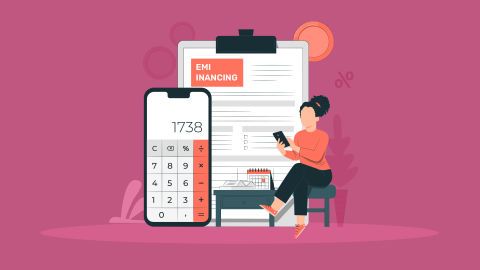Key takeaways
- Choose a comfortable loan repayment schedule and EMI amount that can be committed to despite unforeseen circumstances
- Talk to your lender about an EMI free period, lowering the EMI, or refinancing when a default is foreseen
- CIBIL Score and credit worthiness are adversely impacted when EMI payment is missed
When the pandemic hit India, there was an economic meltdown. With people losing jobs and their means of livelihood, EMI payment default was at an all-time high. During the pandemic, a moratorium period was offered and more than half the retail borrowers had opted for this. This is a testament to the fact that while people may have a well-thought-out financial plan, certain uncertainties like a loss of a job or a health issue can throw them off track.
While a global crisis offered some respite in terms of loan repayment, such kind of deferral may not always be available. People are bound to suffer consequences if they are unable to repay their borrowed amount on time.
As lenders, we at Bajaj Finserv advise our borrowers to choose a comfortable repayment tenure and follow the EMI payment rules because, while missing one or two instalments may not seem like a deal, it will have an adverse impact.
One solution that offers a comfortable repayment tenure is the Bajaj Finserv Insta EMI Card. Shopping using the Insta EMI Card allows you to convert your purchases into easy EMIs that you can repay over a period of 3 months to 60 months. You might already be eligible – check your offers now by entering your mobile number and OTP.
What happens if EMI is not paid on time
Paying your EMIs on time is a very crucial process of availing the pay later scheme. If there is any delay in your EMI payments, it will have the following repercussions.
- Decrease in the CIBIL Score: The most obvious impact is a decrease in the borrower’s credit score. Missing even one instalment can lead to a drop in the score by 50 to 70 points. Most lenders look for a high credit score of around 750, so getting a loan in the future will be difficult.
- Questionable creditworthiness: A person’s credit score reflects their repayment history and a repayment default will reflect in the borrower’s credit report. This makes it difficult to borrow in the future and questions the person’s integrity and creditworthiness. They become risky borrowers for lenders and are considered to have high chances of defaulting on the loan repayment terms.
- Penalties are levied: Multiple financial institutions charge a penalty for individuals who have missed their EMI payments. This can be in the form of late fees or a higher interest rate for the EMI. This amount is about 1% -2% of the EMI.
- Property might be seized: If you took a loan against property and default on payments despite regular warnings, your property against which the loan was taken can be seized by the lender.
Check your eligibility for a Bajaj Finserv Insta EMI Card today. You may already be eligible – find out by entering your mobile number and completing OTP verification.
How can one avoid the default consequences?
Ideally, loan defaults should not be encountered at all. However, in the case of an unavoidable circumstance, a few steps can be taken.
- Talk to the lender: When a borrower foresees a situation where they will miss an EMI payment, it is wise to discuss options with their lender and request a lower EMI. Lenders can lower EMIs by either extending the current loan tenure or increasing the rate of interest. Alternatively, they convert an unsecured loan to a secured loan.
- Refinancing: Taking a top-up loan may be a good idea, but this is only possible if the credit score is high.
- Better financial planning: To prevent a loan default, plan finances more efficiently. Don’t go for a higher loan amount, higher repayment amount, or a shorter tenure that can be comfortably managed.
- Part payments with additional income: When there is a surplus of funds like a bonus, opt for foreclosure or part prepayment to reduce the financial burden. Try and find another source of income or cut back on expenses.
- Request the lender for an EMI-free period: In exceptional cases, such as a business halt or job loss, your lender may allow you to stop paying your EMI for three to six months at their discretion. After this period, you will need to resume your regular EMI payment per the schedule. However, it is entirely up to the lender to decide whether or not to grant this flexibility of an EMI-free period.
Benefits of timely EMI payments
You may already be eligible for a Insta EMI Card – check now using your mobile number and OTP for verification.






